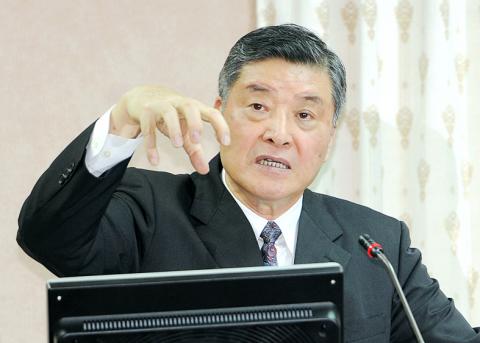Minister of National Defense Kao Hua-chu (高華柱) apologized yesterday for the crashes of two air force fighter jets within five days of each other earlier this month, but added that pilots need public support to regain their confidence as soon as possible.
Kao was responding to questions from lawmakers about the availability of the nation’s air arsenal after the crashes of an F-16 and a Mirage 2000-5.
“I’m more than willing to offer an apology to the public for the mishaps and will assume full political responsibility for them,” Kao told lawmakers.

Photo: Liao Chen-huei, Taipei Times
He said the most important thing is to ascertain the cause of the crashes.
“Special task forces have been formed to investigate each crash,” Kao said, adding that the early signs show mechanical failure to be the most likely cause of the accidents.
On May 15, a single-seater F-16 of the 455th Tactical Fighter Wing crashed into waters southwest of Chiayi. Its 26-year-old pilot managed to eject to safety.
The other incident involved a twin-seater Mirage 2000-5 belonging to the 499th Tactical Fighter Wing based in Hsinchu, which crashed off the western coast shortly after takeoff on May 20. Again, its two pilots were able to bail out safely.
Despite the crashes, Kao assured lawmakers that all Air Force aircraft on active duty are in good and serviceable condition.
“The availability rate of our air arsenal for active service meets the nation’s requirements,” Kao said.
US-built F-16s, French-made Mirage 2000-5s and locally developed Ching-kuo IDF jets form the backbone of the nation’s air defenses.
Asked about progress of the military’s plan to procure new warplanes that would constitute a third generation of aircraft for the Air Force, Kao said the procurement of US-built F-35 jets is a long-term target.
“Before this goal is realized, we have other projects to complete to meet our defense needs,” Kao said.
Previous media reports have said Taiwan is looking to buy an F-35 variant with short takeoff and vertical-land capabilities.

Alain Robert, known as the "French Spider-Man," praised Alex Honnold as exceptionally well-prepared after the US climber completed a free solo ascent of Taipei 101 yesterday. Robert said Honnold's ascent of the 508m-tall skyscraper in just more than one-and-a-half hours without using safety ropes or equipment was a remarkable achievement. "This is my life," he said in an interview conducted in French, adding that he liked the feeling of being "on the edge of danger." The 63-year-old Frenchman climbed Taipei 101 using ropes in December 2004, taking about four hours to reach the top. On a one-to-10 scale of difficulty, Robert said Taipei 101

A preclearance service to facilitate entry for people traveling to select airports in Japan would be available from Thursday next week to Feb. 25 at Taiwan Taoyuan International Airport, Taoyuan International Airport Corp (TIAC) said on Tuesday. The service was first made available to Taiwanese travelers throughout the winter vacation of 2024 and during the Lunar New Year holiday. In addition to flights to the Japanese cities of Hakodate, Asahikawa, Akita, Sendai, Niigata, Okayama, Takamatsu, Kumamoto and Kagoshima, the service would be available to travelers to Kobe and Oita. The service can be accessed by passengers of 15 flight routes operated by

Taiwanese and US defense groups are collaborating to introduce deployable, semi-autonomous manufacturing systems for drones and components in a boost to the nation’s supply chain resilience. Taiwan’s G-Tech Optroelectronics Corp subsidiary GTOC and the US’ Aerkomm Inc on Friday announced an agreement with fellow US-based Firestorm Lab to adopt the latter’s xCell, a technology featuring 3D printers fitted in 6.1m container units. The systems enable aerial platforms and parts to be produced in high volumes from dispersed nodes capable of rapid redeployment, to minimize the risk of enemy strikes and to meet field requirements, they said. Firestorm chief technology officer Ian Muceus said

MORE FALL: An investigation into one of Xi’s key cronies, part of a broader ‘anti-corruption’ drive, indicates that he might have a deep distrust in the military, an expert said China’s latest military purge underscores systemic risks in its shift from collective leadership to sole rule under Chinese President Xi Jinping (習近平), and could disrupt its chain of command and military capabilities, a national security official said yesterday. If decisionmaking within the Chinese Communist Party has become “irrational” under one-man rule, the Taiwan Strait and the regional situation must be approached with extreme caution, given unforeseen risks, they added. The anonymous official made the remarks as China’s Central Military Commission Vice Chairman Zhang Youxia (張又俠) and Joint Staff Department Chief of Staff Liu Zhenli (劉振立) were reportedly being investigated for suspected “serious